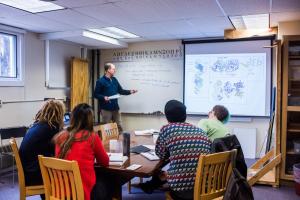A Fresh Look at Curriculum
 Marlboro understandably takes pride in an academic program rich with interdisciplinary possibilities and supportive of the intellectual passions of its students. In the interest of that ongoing support, the faculty have been looking critically at the curriculum, leading to exciting initiatives that will be evolving and unfolding over the coming years. One of these is an elective course on living and working in community, introduced as a pilot this fall. The other has to do with making a clearer and more consistent “progression” from the sophomore year to being “on Plan.”
Marlboro understandably takes pride in an academic program rich with interdisciplinary possibilities and supportive of the intellectual passions of its students. In the interest of that ongoing support, the faculty have been looking critically at the curriculum, leading to exciting initiatives that will be evolving and unfolding over the coming years. One of these is an elective course on living and working in community, introduced as a pilot this fall. The other has to do with making a clearer and more consistent “progression” from the sophomore year to being “on Plan.”
“These are both initiatives that are still in progress but that signal a move toward better integration between what we say we do, what we actually do, and what we aspire to do,” says Brenda Foley, theater professor and member of the Renaissance Group, which coordinated the initiatives.
“The Progression is the most complete and sweeping change to come out of this movement of review and reform,” said John Sheehy, literature and writing professor and another member of the Renaissance Group. “It is the result of some pretty serious rethinking of our advising model, and it enacts substantive changes in practice over the next couple of years.”
As it stands, the Progression is a proposed benchmark event that will help structure and solidify the transition from the first two years to the second two years at Marlboro. Supported by the building of a student portfolio starting on day one, and informed by the sophomore review, the Progression is a conversation between students and their advisors from which the preliminary Plan application emerges. The idea is to give this crucial period of transition more definition, while allowing for a range of approaches deemed valuable to individual faculty members and students.
“Although this will take some time to implement, it is an important beginning,” says John. “The process has been a valuable time for the faculty to put their hands under the hood and see what works. The point was never to ‘fix’ the college—the point was to re-engage, as faculty, with the curriculum. That we have done, and that we must continue to do.” Look for an article on the new course on living and working in community in the next issue of Potash Hill.
